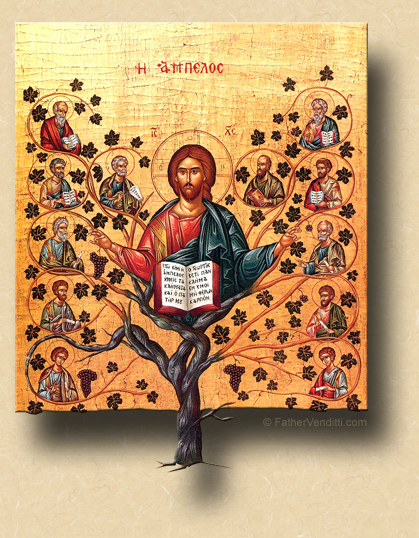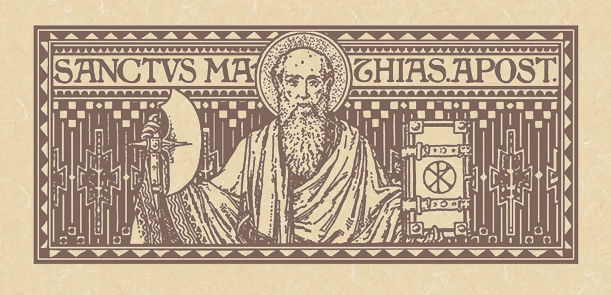Why the Pope Can't Ordain Women Even If He Wanted To.*
The Feast of Saint Matthias, Apostle.
Lessons from the proper, according to the ordinary form of the Roman Rite:
• Acts 1: 15-17, 20-26.
• Psalm 113: 1-8.
• John 15: 9-17.
The First Class Vigil of Whitsunday.**
Lessons from the proper, according to the extraordinary form of the Roman Rite:
• Acts 19: 1-8.
• [The Gradual is omitted.]
• John 14: 15-21.
The Second Saturday after Ascension; the Fifth All Souls Saturday; and, the Feast of the Holy Martyr Isidore.
First & third lessons from the pentecostarion, second & fourth from the menaion for the dead, according to the Ruthenian recension of the Byzantine Rite:
• Acts 28: 1-31.
• I Thessalonians 4: 13-17.
• John 21: 15-25.
• John 5: 24-30.
FatherVenditti.com
|
 2:16 PM 5/14/2016 — Today's first lesson from the Acts of the Apostles, on the feast of the one Apostle we probably don't think too much about, shows the early Church struggling to deal with a very practical concern. Judas was one of the twelve Apostles of our Lord. As Saint Peter tells the assembled brethren, “Judas was counted among our number, and had been given a share in this ministry of ours” (1: 17 Knox). But after he betrayed our Lord, Judas took his own life, as you know, which left only eleven Apostles remaining; and, in his own brand of Biblical exegesis, Peter harkens back to the words of King David, quoting Psalm 108: “Swiftly let his days come to an end, and his office be entrusted to another” (v. 8 Knox); an artificial use of Scripture to be sure; but, I'm not about to question the first Vicar of Christ on how he chooses to interpret the Old Testament. The bottom line is that Saint Peter, the first Pope, had decided that Judas needed to be replaced;—whether that's justified by quoting the Psalms, Peter, I'm sure, will explain to me when I see him face to face on the day of my own judgment—and, our lesson from Acts recounts for us the process through which the Apostles chose Saint Matthias as Judas' replacement. 2:16 PM 5/14/2016 — Today's first lesson from the Acts of the Apostles, on the feast of the one Apostle we probably don't think too much about, shows the early Church struggling to deal with a very practical concern. Judas was one of the twelve Apostles of our Lord. As Saint Peter tells the assembled brethren, “Judas was counted among our number, and had been given a share in this ministry of ours” (1: 17 Knox). But after he betrayed our Lord, Judas took his own life, as you know, which left only eleven Apostles remaining; and, in his own brand of Biblical exegesis, Peter harkens back to the words of King David, quoting Psalm 108: “Swiftly let his days come to an end, and his office be entrusted to another” (v. 8 Knox); an artificial use of Scripture to be sure; but, I'm not about to question the first Vicar of Christ on how he chooses to interpret the Old Testament. The bottom line is that Saint Peter, the first Pope, had decided that Judas needed to be replaced;—whether that's justified by quoting the Psalms, Peter, I'm sure, will explain to me when I see him face to face on the day of my own judgment—and, our lesson from Acts recounts for us the process through which the Apostles chose Saint Matthias as Judas' replacement.
There is an important point here about which I think it is important for us to reflect. Why is it so important to Peter that there be twelve Apostles? Why can't the Church make due with eleven Apostles? Why can't there be thirteen Apostles, for that matter? Why not twenty-six Apostles? What's so special about the number twelve? The answer is obvious, and you know it already: there has to be twelve Apostles because Jesus chose twelve Apostles. Whether is was meant by Him to reference the Twelve Tribes of Israel is more a matter of poetry than theology; but regardless, the number of Apostles was established by Christ, Himself. And so we see, very early in the life of the Church, right on the heals of our Lord's bodily Ascension, the pattern being established by which the institution of the Church forms itself, under the leadership of the first Pope, to imitate the practice of Christ her Head. To be sure: when Saint Paul called the Church the Body of Christ, he wasn't simply engaging in literary hyperbole; the Church is Christ, and Christ is the Church, and the Church must always do as Christ has done.
Now, as obvious as this sounds to you and me, you'd be surprised—I hope—to realize how many there are in the Church today who take issue with this. I did my minor seminary training out in Kentucky, where I took my degree in philosophy;—in those days, you had to have a bachelor's degree in philosophy before you could be admitted to the major seminary, and St. Pius X in Kentucky was one of the last minor seminaries that offered that degree, which is how I ended up there—and, the bishop of Covington, Kentucky, at the time was old, crusty Bishop Ackerman; he's been dead many years now, so I can talk about him. When you met him for the first time, he scared the daylights out of you: he had this perpetual scowl on his face, and every word out of his mouth was some kind of bark or growl. In reality, he was a very kind and grace-filled man whose bark was much worse than his bite; but, you couldn't realize that until you took the time to get to know him. And this was back in the late '70s and early '80s when so many strange things were happening in the Church and everyone was confused. And someone asked Bishop Ackerman, “Why can't a woman be a priest?” And we all smiled to ourselves because we knew that the poor sap who asked this question was about to get a lightening bolt shot up his rear end. And Bishop Ackerman slowly leaned right into this poor guys face, and growled, “For the same reason a tree trunk can't be a priest.”
Now, you could never get away with saying that today because it would be grossly offensive, and I would never respond to that question that way; but, what Bishop Ackerman was saying, in his own peculiar manner, was what the Church has understood since the time of Peter: a woman cannot be a priest because the female of the human species is invalid matter for the sacrament of the Holy Priesthood. Why must bread and wine be used in the celebration of the Holy Eucharist? Why can't you say Mass using a chocolate chip cookie and orange juice? Because Jesus, at the Last Supper, didn't use a chocolate chip cookie and orange juice; He used bread and wine. Only bread and wine is valid matter for the sacrament of the Holy Eucharist, because that's the way it was instituted by Christ. If Jesus had made a woman one of His twelve Apostles, then the Church could ordain women to the Holy Priesthood today, but he didn't. It's ironic, because—and I know this from my years as a pastor—in the Church today, the only people you can depend on to get anything done when it needs to be done are the women. The men are great for throwing out ideas and telling the priest what they think he should do, but they're useless when it comes to actually doing anything; it's the women who typically do all the work. That being said, they can't be priests, and it has nothing to do with their personal suitability; and, even if some renegade bishop somewhere were to lay his hands on the head of a woman and pronounce the sacramental words that normally make a priest, she would not become a priest, because the sacrament of the priesthood cannot exist in her. It isn't a “rule” or “regulation” of Canon Law that women cannot be priests; it's a sacramental fact … just as it's a sacramental fact that, if I were to stand here in front of you and pronounce the words of consecration over a chocolate chip cookie and orange juice, it would not become the Blessed Sacrament.
When Peter, in our first lesson today, insists that the brethren must choose a replacement for Judas so that the number of Apostles is restored to twelve, he is declaring that even he, as Pope, cannot do whatever he wants, but must act in accord with what was done by Christ, Himself.

* This title was inspired by the Holy Father's announcement to create a commission to consider the ordination of women to the diaconate. What is often missed by the uninformed, however, is that this question is not based on a consideration of whether a woman can be ordained, but whether the diaconate is a sharing in the Sacrament of Holy Orders, a presumption which seems universal, but is by no means a settled question. The same is true regarding whether the making of a bishop is a sharing in that same sacrament. In other words, can a "sacrament of the living," which imparts an indelible mark, be repeated or received in degrees? The Fathers of the Church, and the Church herself for four centuries, say "no." Cf. my article here for more information.
It should also be noted that Pope Benedict established a commission to address this very same question, and considered the matter settled afterward.
** In the Roman Rite, the concept of a vigil differs completely between the ordinary and extraordinary forms. In the ordinary form, a vigil is simply a celebration of the feast the evening before, either prior to or following First Vespers. On Solemnities on which an obligation has been attached, this may be fulfilled at either the Mass of the vigil or the feast. The vigil Mass may or may not have texts and lessons of its own, depending on the feast; if it does not, then the lessons of the feast are used.
In the extraordinary form, the word “vigil” designates the entire day before a First Class Feast, and the Mass on that day takes place in the morning. The texts and lessons, while proper to the vigil, are always different from that of the feast itself, and no obligation is satisfied.
Because the Vigil of Whitsunday (Pentecost) is of the First Class, the Commemoration of Saint Boniface, ordinarily observed today, is suppressed.
|

